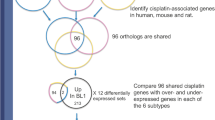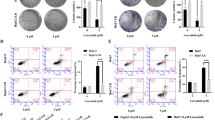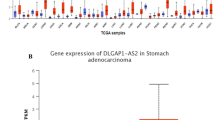Abstract
A series of chemotherapeutic drugs that induce DNA damage, such as cisplatin (DDP), are standard clinical treatments for ovarian cancer, testicular cancer, and other diseases that lack effective targeted drug therapy. Drug resistance is one of the main factors limiting their application. Sensitizers can overcome the drug resistance of tumor cells, thereby enhancing the antitumor activity of chemotherapeutic drugs. In this study, we aimed to identify marketable drugs that could be potential chemotherapy sensitizers and explore the underlying mechanisms. We found that the alcohol withdrawal drug disulfiram (DSF) could significantly enhance the antitumor activity of DDP. JC-1 staining, propidium iodide (PI) staining, and western blotting confirmed that the combination of DSF and DDP could enhance the apoptosis of tumor cells. Subsequent RNA sequencing combined with Gene Set Enrichment Analysis (GSEA) pathway enrichment analysis and cell biology studies such as immunofluorescence suggested an underlying mechanism: DSF makes cells more vulnerable to DNA damage by inhibiting the Fanconi anemia (FA) repair pathway, exerting a sensitizing effect to DNA damaging agents including platinum chemotherapy drugs. Thus, our study illustrated the potential mechanism of action of DSF in enhancing the antitumor effect of DDP. This might provide an effective and safe solution for combating DDP resistance in clinical treatment.
概要
由于缺乏有效的靶向药物,顺铂(DDP)等一系列DNA损伤诱导剂一直是卵巢癌、睾丸癌等恶性肿瘤的重要临床治疗药物。然而,临床上出现的耐药性是限制该类药物应用的主要因素之一。药物增敏剂可以克服肿瘤细胞耐药性,从而增强化疗药物的抗肿瘤活性。在本研究中,我们旨在从上市药物中发现潜在的化疗药物增敏剂,并探索其潜在的作用机制。通过系统筛选,我们发现戒酒药物双硫仑(DSF)可以增强DDP的抗肿瘤活性。通过JC-1染色、碘化丙啶(PI)染色和蛋白质印迹等实验证实DSF和DDP的合用可协同促进肿瘤细胞发生凋亡。通过RNA测序结合基因富集分析(GSEA)以及免疫荧光等细胞生物学实验,我们发现DSF协同DDP抗肿瘤作用的潜在分子机制:DSF通过抑制范可尼贫血(FA)修复途径使肿瘤细胞更容易发生DNA损伤,因此可对包括铂类化疗药物在内的引起DNA损伤的药物产生增敏作用。我们的这项研究揭示了DSF在增强DDP抗肿瘤作用方面的潜在机制,为临床治疗中的DDP耐药提供了一种潜在的安全有效的解决方案。
Similar content being viewed by others
References
Bai ZS, Peng YL, Ye XY, et al., 2022. Autophagy and cancer treatment: four functional forms of autophagy and their therapeutic applications. J Zhejiang Univ-Sci B (Biomed & Biotechnol), 23(2):89–101. https://doi.org/10.1631/jzus.B2100804
Brabec V, Nováková O, 2006. DNA binding mode of ruthenium complexes and relationship to tumor cell toxicity. Drug Resist Updat, 9(3):111–122. https://doi.org/10.1016/j.drup.2006.05.002
Castella M, Jacquemont C, Thompson EL, et al., 2015. FANCI regulates recruitment of the FA core complex at sites of DNA damage independently of FANCD2. PLoS Genet, 11(10):e1005563. https://doi.org/10.1371/journal.pgen.1005563
Chen SY, Chang YL, Liu ST, et al., 2021. Differential cytotoxicity mechanisms of copper complexed with disulfiram in oral cancer cells. Int J Mol Sci, 22(7):3711. https://doi.org/10.3390/ijms22073711
Chen Z, Chen JJ, 2021. Mass spectrometry-based protein-protein interaction techniques and their applications in studies of DNA damage repair. J Zhejiang Univ-Sci B (Biomed & Biotechnol), 22(1):1–20. https://doi.org/10.1631/jzus.B2000356
Fang L, Qi H, Wang P, et al., 2022. UPF1 increases amino acid levels and promotes cell proliferation in lung adenocarcinoma via the eIF2α-ATF4 axis. J Zhejiang Univ-Sci B (Biomed & Biotechnol), 23(10):863–875. https://doi.org/10.1631/jzus.B2200144
Feng YL, Liu SC, Chen RD, et al., 2021. Target binding and residence: a new determinant of DNA double-strand break repair pathway choice in CRISPR/Cas9 genome editing. J Zhejiang Univ-Sci B (Biomed & Biotechnol), 22(1):73–86. https://doi.org/10.1631/jzus.B2000282
Galluzzi L, Senovilla L, Vitale I, et al., 2012. Molecular mechanisms of cisplatin resistance. Oncogene, 31(15): 1869–1883. https://doi.org/10.1038/onc.2011.384
Guo LM, Cui J, Wang HR, et al., 2021. Metformin enhances anti-cancer effects of cisplatin in meningioma through AMPK-mTOR signaling pathways. Mol Ther Oncolytics, 20:119–131. https://doi.org/10.1016/j.omto.2020.11.004
Halatsch ME, Kast RE, Karpel-Massler G, et al., 2021. A phase Ib/IIa trial of 9 repurposed drugs combined with temozolomide for the treatment of recurrent glioblastoma: CUSP9v3. Neuro-Oncol Adv, 3(1):vdab075. https://doi.org/10.1093/noajnl/vdab075
Ishiai M, 2021. Regulation of the fanconi anemia DNA repair pathway by phosphorylation and monoubiquitination. Genes, 12(11):1763. https://doi.org/10.3390/genes12111763
Jangra A, Choi SA, Yang J, et al., 2020. Disulfiram potentiates the anticancer effect of cisplatin in atypical teratoid/ rhabdoid tumors (AT/RT). Cancer Lett, 486:38–45. https://doi.org/10.1016/j.canlet.2020.05.006
Kim SK, Kim H, Lee DH, et al., 2013. Reversing the intractable nature of pancreatic cancer by selectively targeting ALDH-high, therapy-resistant cancer cells. PLoS ONE, 8(10):e78130. https://doi.org/10.1371/journal.pone.0078130
Kita Y, Hamada A, Saito R, et al., 2019. Systematic chemical screening identifies disulfiram as a repurposed drug that enhances sensitivity to cisplatin in bladder cancer: a summary of preclinical studies. Br J Cancer, 121(12):1027–1038. https://doi.org/10.1038/s41416-019-0609-0
Lee JO, Kang MJ, Byun WS, et al., 2019. Metformin overcomes resistance to cisplatin in triple-negative breast cancer (TNBC) cells by targeting RAD51. Breast Cancer Res, 21: 115. https://doi.org/10.1186/s13058-019-1204-2
Liang ZR, Zhang T, Zhan T, et al., 2021. Metformin alleviates cisplatin-induced ototoxicity by autophagy induction possibly via the AMPK/FOXO3a pathway. J Neurophysiol, 125(4):1202–1212. https://doi.org/10.1152/jn.00417.2020
Liu CC, Wu CL, Lin MX, et al., 2021. Disulfiram sensitizes a therapeutic-resistant glioblastoma to the TGF-β receptor inhibitor. Int J Mol Sci, 22(19):10496. https://doi.org/10.3390/ijms221910496
Majera D, Skrott Z, Chroma K, et al., 2020. Targeting the NPL4 adaptor of p97/VCP segregase by disulfiram as an emerging cancer vulnerability evokes replication stress and DNA damage while silencing the ATR pathway. Cells, 9(2):469. https://doi.org/10.3390/cells9020469
Makovec T, 2019. Cisplatin and beyond: molecular mechanisms of action and drug resistance development in cancer chemotherapy. Radiol Oncol, 53(2):148–158. https://doi.org/10.2478/raon-2019-0018
Min KA, Yu FQ, Yang VC, et al., 2010. Transcellular transport of heparin-coated magnetic iron oxide nanoparticles (Hep-MION) under the influence of an applied magnetic field. Pharmaceutics, 2(2):119–135. https://doi.org/10.3390/pharmaceutics2020119
Nakano T, Warner KA, Oklejas AE, et al., 2021. mTOR inhibition ablates cisplatin-resistant salivary gland cancer stem cells. J Dent Res, 100(4):377–386. https://doi.org/10.1177/0022034520965141
Nechushtan H, Hamamreh Y, Nidal S, et al., 2015. A phase IIb trial assessing the addition of disulfiram to chemotherapy for the treatment of metastatic non-small cell lung cancer. Oncologist, 20(4):366–367. https://doi.org/10.1634/theoncologist.2014-0424
Park YM, Go YY, Shin SH, et al., 2018. Anti-cancer effects of disulfiram in head and neck squamous cell carcinoma via autophagic cell death. PLoS ONE, 13(9):e0203069. https://doi.org/10.1371/journal.pone.0203069
Qi X, Yan DH, Zuo JC, et al., 2021. Development of a novel chemokine signaling-based multigene signature to predict prognosis and therapeutic response in colorectal cancer. J Zhejiang Univ-Sci B (Biomed & Biotechnol), 22(12):1053–1059. https://doi.org/10.1631/jzus.B2100412
Ren XY, Li YC, Zhou Y, et al., 2021. Overcoming the compensatory elevation of NRF2 renders hepatocellular carcinoma cells more vulnerable to disulfiram/copper-induced ferroptosis. Redox Biol, 46:102122. https://doi.org/10.1016/j.redox.2021.102122
Rocha CRR, Silva MM, Quinet A, et al., 2018. DNA repair pathways and cisplatin resistance: an intimate relationship. Clinics, 73(S1):e478s. https://doi.org/10.6061/clinics/2018/e478s
Schmidtova S, Kalavska K, Gercakova K, et al., 2019. Disulfiram overcomes cisplatin resistance in human embryonal carcinoma cells. Cancers, 11(9):1224. https://doi.org/10.3390/cancers11091224
Skrott Z, Mistrik M, Andersen KK, et al., 2017. Alcoholabuse drug disulfiram targets cancer via p97 segregase adaptor NPL4. Nature, 552(7684):194–199. https://doi.org/10.1038/nature25016
Skrott Z, Majera D, Gursky J, et al., 2019. Disulfiram’s anticancer activity reflects targeting NPL4, not inhibition of aldehyde dehydrogenase. Oncogene, 38(40):6711–6722. https://doi.org/10.1038/s41388-019-0915-2
Smogorzewska A, Matsuoka S, Vinciguerra P, et al., 2007. Identification of the FANCI protein, a monoubiquitinated FANCD2 paralog required for DNA repair. Cell, 129(2): 289–301. https://doi.org/10.1016/j.cell.2007.03.009
Wang K, Michelakos T, Wang B, et al., 2021. Targeting cancer stem cells by disulfiram and copper sensitizes radio-resistant chondrosarcoma to radiation. Cancer Lett, 505: 37–48. https://doi.org/10.1016/j.canlet.2021.02.002
Wu Q, Zhang MY, Wen YM, et al., 2022. Identifying chronic alcoholism drug disulfiram as a potent DJ-1 inhibitor for cancer therapeutics. Eur J Pharmacol, 926:175035. https://doi.org/10.1016/j.ejphar.2022.175035
Xia L, Lin HX, Zhou YM, et al., 2022. ZNF750 facilitates carcinogenesis via promoting the expression of long non-coding RNA CYTOR and influences pharmacotherapy response in colon adenocarcinoma. J Zhejiang Univ-Sci B (Biomed& Biotechnol), 23(7):587–596. https://doi.org/10.1631/jzus.B2100939
Xu YQ, Zhou Q, Feng XL, et al., 2020. Disulfiram/copper markedly induced myeloma cell apoptosis through activation of JNK and intrinsic and extrinsic apoptosis pathways. Biomed Pharmacother, 126:110048. https://doi.org/10.1016/j.biopha.2020.110048
Yang YY, Lindsey-Boltz LA, Vaughn CM, et al., 2021. Circadian clock, carcinogenesis, chronochemotherapy connections. J Biol Chem, 297(3):101068. https://doi.org/10.1016/j.jbc.2021.101068
Yang Z, Guo F, Albers AE, et al., 2019. Disulfiram modulates ROS accumulation and overcomes synergistically cisplatin resistance in breast cancer cell lines. Biomed Pharmacother, 113:108727. https://doi.org/10.1016/j.biopha.2019.108727
Yarde DN, Oliveira V, Mathews L, et al., 2009. Targeting the Fanconi anemia/BRCA pathway circumvents drug resistance in multiple myeloma. Cancer Res, 69(24):9367–9375. https://doi.org/10.1158/0008-5472.CAN-09-2616
Zhang HJ, Chen D, Ringler J, et al., 2010. Disulfiram treatment facilitates phosphoinositide 3-kinase inhibition in human breast cancer cells in vitro and in vivo. Cancer Res, 70(10):3996–4004. https://doi.org/10.1158/0008-5472.CAN-09-3752
Zhao LJ, Teng B, Wen LJ, et al., 2014. mTOR inhibitor AZD8055 inhibits proliferation and induces apoptosis in laryngeal carcinoma. Int J Clin Exp Med, 7(2):337–347.
Zhong WW, Wang DJ, Yao B, et al., 2021. Integrative analysis of prognostic long non-coding RNAs with copy number variation in bladder cancer. J Zhejiang Univ-Sci B (Biomed & Biotechnol), 22(8):664–681. https://doi.org/10.1631/jzus.B2000494
Zirjacks L, Stransky N, Klumpp L, et al., 2021. Repurposing disulfiram for targeting of glioblastoma stem cells: an in vitro study. Biomolecules, 11(11): 1561. https://doi.org/10.3390/biom11111561
Acknowledgments
The work was supported by the National Natural Science Foundation of China (No. 82104192), the Zhejiang Provincial Natural Science Foundation (No. LR22H310002), the Scientific Research Fund of Zhejiang University (No. XY2021044), and the Zhejiang University K. P. Chao’s High Technology Development Foundation.
Author information
Authors and Affiliations
Corresponding authors
Additional information
Author contributions
Meng YUAN, Qian WU, Mingyang ZHANG, Minshan LAI, and Wenbo CHEN performed the experimental research and data analysis. Meng YUAN, Qian WU, and Minshan LAI wrote and edited the manuscript. Jianfeng YANG, Li JIANG, and Ji CAO contributed to the study design, writing, and editing of the manuscript. All authors have read and approved the final manuscript, and therefore, have full access to all the data in the study and take responsibility for the integrity and security of the data.
Compliance with ethics guidelines
Meng YUAN, Qian WU, Mingyang ZHANG, Minshan LAI, Wenbo CHEN, Jianfeng YANG, Li JIANG, and Ji CAO declare that they have no conflict of interest.
This article does not contain any studies with human or animal subjects performed by any of the authors.
Supplementary information
Figs. S1 and S2
Rights and permissions
About this article
Cite this article
Yuan, M., Wu, Q., Zhang, M. et al. Disulfiram enhances the antitumor activity of cisplatin by inhibiting the Fanconi anemia repair pathway. J. Zhejiang Univ. Sci. B 24, 207–220 (2023). https://doi.org/10.1631/jzus.B2200405
Received:
Accepted:
Published:
Issue Date:
DOI: https://doi.org/10.1631/jzus.B2200405




